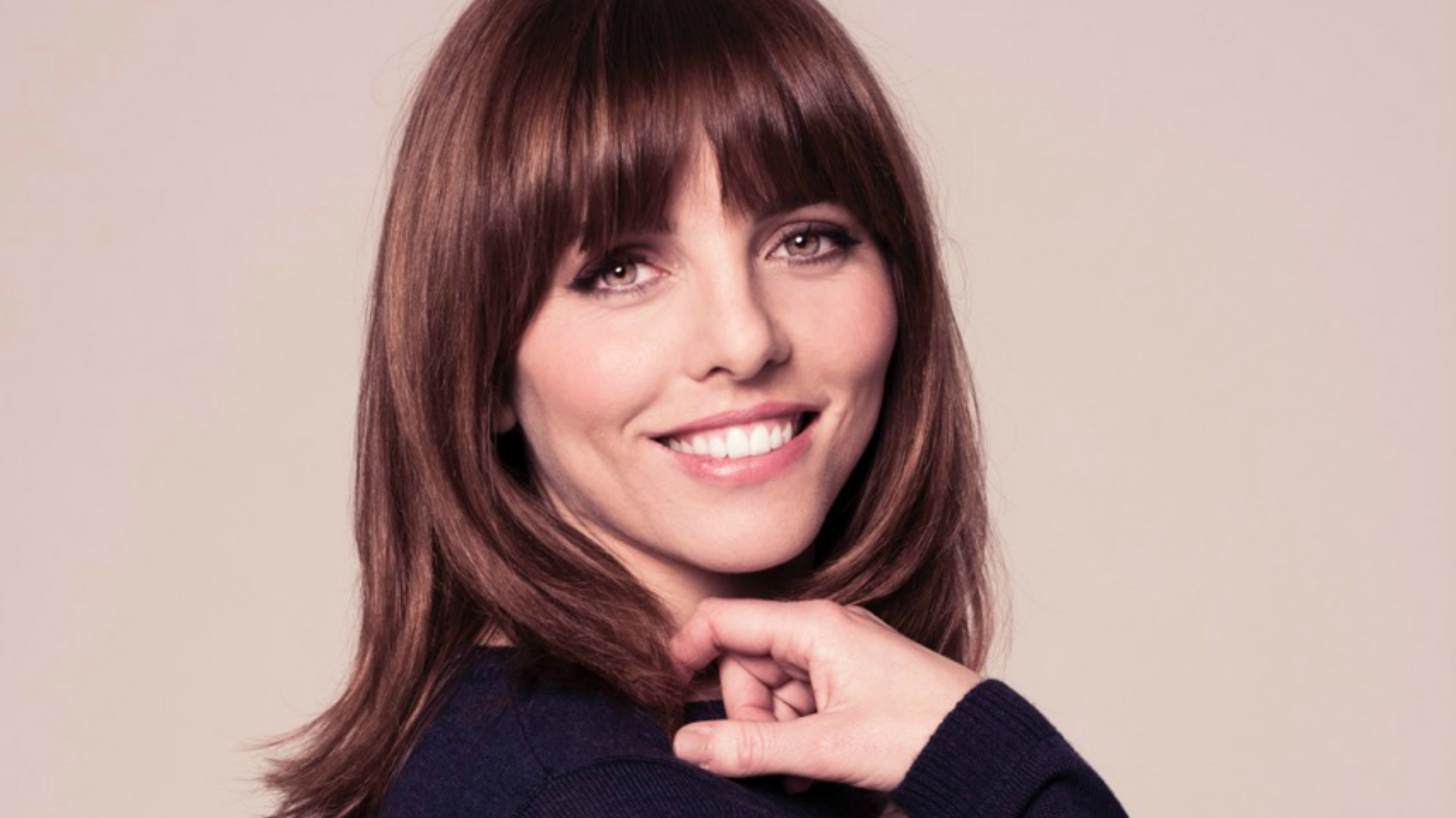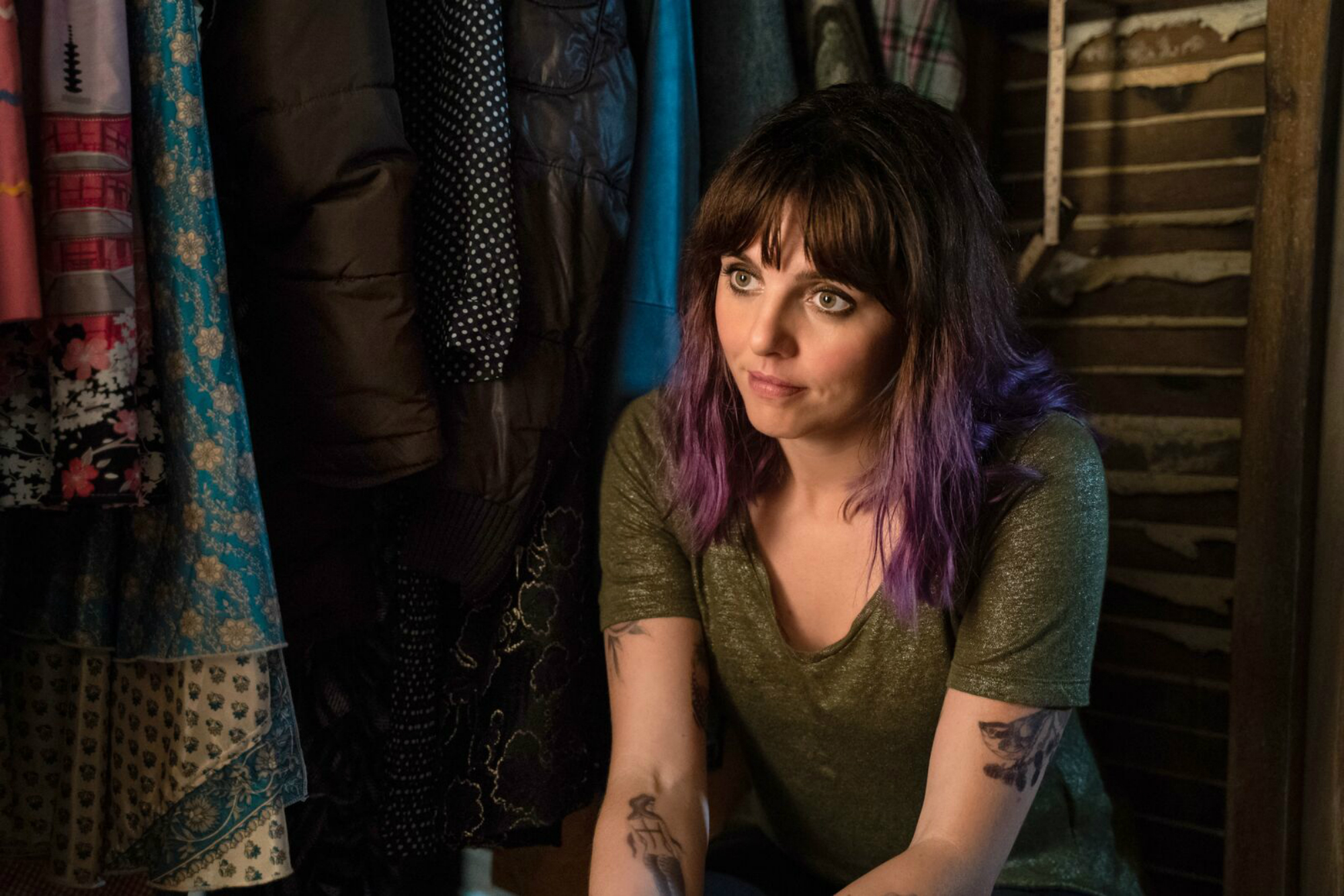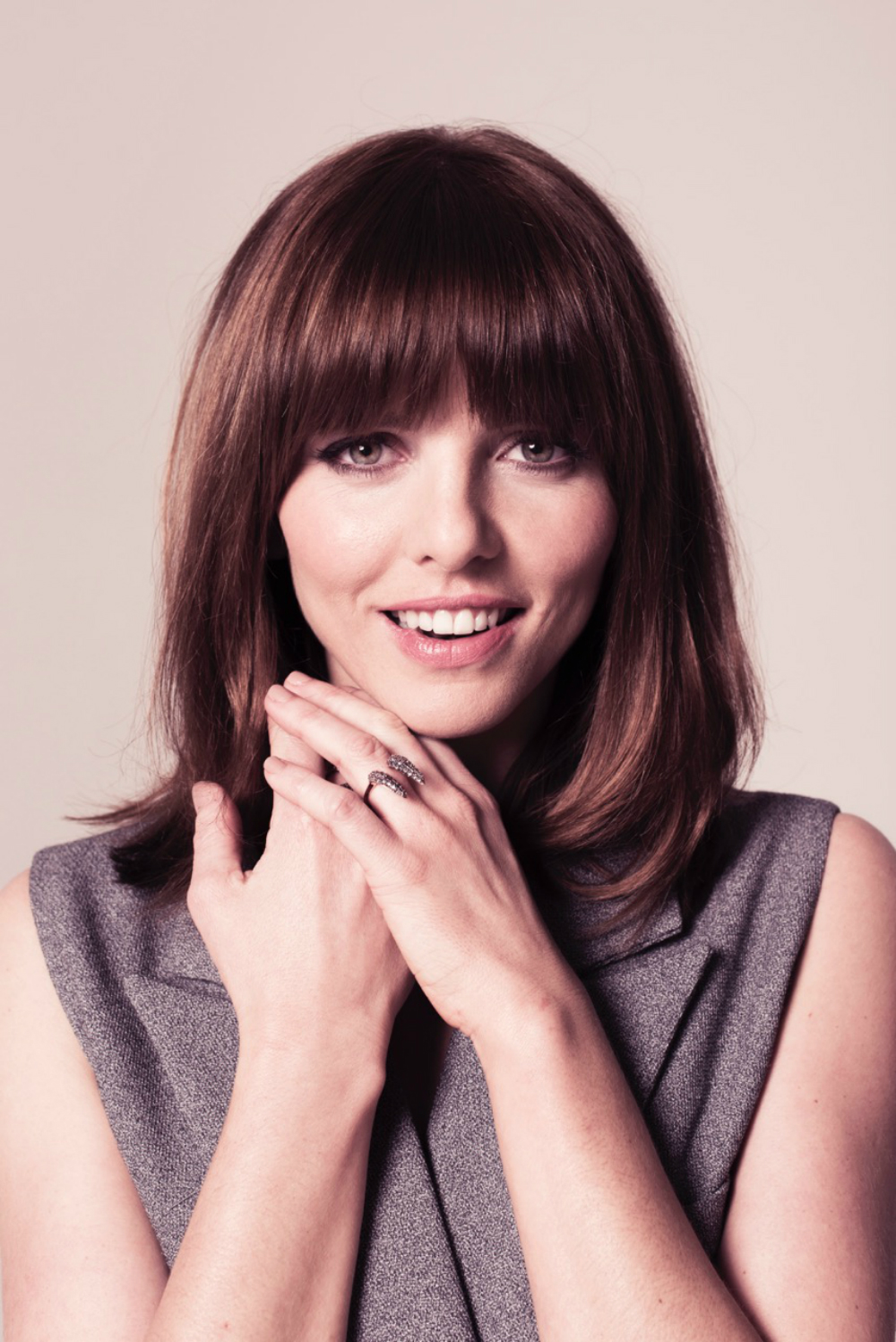Ophelia Lovibond: 'If you have a safety net, you’ll fall'
The actress on her latest Disney role, what she learned from Jim Carrey and why cliff-jumping is the new mindfulness...

Celebrity news, beauty, fashion advice, and fascinating features, delivered straight to your inbox!
You are now subscribed
Your newsletter sign-up was successful
The actress on her latest Disney role, what she learned from Jim Carrey and why cliff-jumping is the new mindfulness...
For many of us, the current global crisis has brought about an altogether slower pace of life. One woman making the most of it? Actress Ophelia Lovibond, one of our hardest-working exports. Currently starring in Timmy Failure as Patty (a purple-haired, tattooed Disney mum - more on that shortly) you can also catch her as Binky in C4 comedy Feel Good and in Apple TV's Trying! as Erica (all out now). Here, the actress fills us in on Timmy Failure, industry idols and how she's navigating life in lockdown…
Congratulations on Timmy Failure! Patty isn't your typical Disney mum – she has purple hair and tattoos, for starters. Was that part of the appeal?
As soon as I read the script I was laughing out loud. It’s the way she interacts with her son and how she understands his language and how he operates, it’s hard to articulate that to other people. And Winslow [Fegley] who plays him did it so brilliantly and exactly as I imagined it. It did appeal to me because she seemed really different to your typical kind of Disney mum, which was brilliant. And because it was Tom McCarthy directing it, I thought, ‘Well, they're not going to iron that out, if anything they’ll amplify it’. I think it's brilliant to see a mum who looks different to someone you might typically see, because mums come in all shapes and sizes.
Seeing mothers in children’s films represented differently - rather than the classic cookie-cutter mould we’re used to - feels like a departure, doesn't it?
Yes and I suppose one reason might be because there's a growing awareness of detecting ‘other’ and there's more than one version of reality and you don’t have to pick just one thing on the screen. There’s a widening awareness of how diverse the world is and therefore it's more interesting to show that diversity on screen - whether it's a mum with purple hair or whatever. So hopefully depictions on screen are following that lead.
You’ve spoken in the past about roles for women sometimes feeling frustrating, did this feel like progress?
Celebrity news, beauty, fashion advice, and fascinating features, delivered straight to your inbox!
I'm glad you said that because I can't write the parts and you can only respond to the ones that come along. So when one comes along, it's so gratifying because you’re like, ‘Look, see how easy that was!’. These women exist, so let's write them! I very much jumped at the chance to marry the two together - my thoughts on it and then my ability to do it. Because it’s not up to me, you need the parts to be written in order to play them.
Did you draw on your own upbringing?
I did. Patty’s got money worries and she's trying to shield that from her son and that was something Tom and I discussed when shooting - how much are you able to hide and how much does that anxiety leak out despite your best intentions? You’re constantly treading this tightrope. My mum spoke to me about how much you share - you don’t want to scare children but you want them to understand. I definitely drew on that and there’s a scene where I really lose my temper. My mum said how that can be horrible because you don’t mean to, but you’re so exhausted. And you are a person - you’re not this infallible, perfect human being.

The message around Timmy himself – celebrating the fact he’s an outsider and doesn’t necessarily fit in – is lovely, too.
It really is, celebrating your individuality. There’s a scene with Craig Robinson when he says, ‘You’re a strange kid with big ideas’ and that’s great. It’s such a simple message but if you're a young kid watching that and hearing that message, if you hear it at just the right moment it could make all the difference.
Did you feel like an outsider growing up?
I don’t know if I was conscious of seeming 'different' but I know I've always been quite precocious! When I started acting I was 10 and remember so clearly saying to my mother I wanted to be an actor – what kind of 10-year-old says that? You think, ‘Well it’s a phase and OK we’ll support that, but next week you’ll probably want to be an astronaut…’. But I knew immediately.
Your first role was in The Wilsons when you were 12. Can you remember how it felt?
Yes, I had the best time! It was the perfect first job because it was filmed in front of a live studio audience. So it was the perfect halfway between doing something on stage and on screen because you had the audience to react to. It was comedy and very bold and actually, that character wore a purple feather boa, so clearly I like purple! The first audition I ever went to I got it, and I remember saying ‘This is so easy’. My agent at the time said, ‘Erm, this isn’t typical of the life, but sure...’!
Is comedy where your heart lies?
I love comedy but it’s never been something where I’ve consciously decided to focus on one thing. It’s just happened that the the parts I tend to get are comedic roles. I think maybe it’s the parts I respond to, and also it’s what’s there at the time. Somebody was asking me about W1A the other day and it didn’t feel like work – it felt like cheating. It was just so much fun and there's not one moment I would take it for granted.
Which of the roles you've played do you think has been the most impactful?
Elementary taught me a lot because it was such a slick operation and Lucy Liu and Johnny Lee Miller are both such great actors. The thing I loved was they were very responsive to what you do with the character - the producers and writers allowed you to have creative freedom. If you said, ‘Is it OK if I play it like this?’ they welcome you developing the character because they write it as you go along. Whereas with British TV everything's written in advance. Hooten & The Lady was challenging - we got to travel all over the place and you’re stroking an elephant’s trunk (that’s not an innuendo!) and thinking, ‘I’m in Cambodia, this is absolutely mad’. If I was able to tell 10-year-old me she’d be in Cambodia filming…you dream of it then you get to do it!
It’s probably not something a careers advisor would offer up, is it?
No way! That's the thing. I actually went to university to study English and people were saying, ‘Oh so is this your back-up plan?’ And I’d say, ‘Oh no, I know I’m going to be acting, I'm just also very interested in literature and want to do this as well because if if I don't do it now I'm not going back as mature student’. They’d say this was my ‘safety net’ but if you have a safety net then you'll fall - if there's no safety net, you have to stay on that tightrope!

Do you believe in taking risks?
Yeah, there’s that quote – ‘A smooth sea never made a good sailor’. My mum said that to me over the years - you’ve got to be challenged.
You've worked with some incredible talents. Who has taught you the most?
A director, Richard Eyre, when I did The Stepmother - he’s just amazing. His ability to tell a story with clarity and no hyperbole, you feel really muscular as an actor when you're working with him. He does it with such a kind of sleight of hand you don't notice you’re this big lump of marble and then by the end of the rehearsal process, you realise he's shaped you into something without you really noticing it happen. And doing Mr Popper’s Penguins with Jim Carrey…
What did you learn from that?
I never used to watch the monitor because I felt like, ‘Will it take me out of the moment or make me self conscious?’. He was like, ‘No, no, no! In comedy it's about timing - it can be a split-second between something being funny and something just not being funny’. So he said if you watch the playback you can see in the frame the composition of what looks funnier – if you do the pratfall a beat earlier for example, it's just funnier. So I started watching the monitors and he’s absolutely right. He taught me to not be afraid or get self-conscious but to examine the screen, figure out what works and do it. And obviously he was an incredibly nice person as well.
You’ve been a vocal supporter of Time’s Up and MeToo – do you think there’s been a palpable change on set?
Obviously I can only speak from my own experience but in the past it has – not on all sets – felt like you have got to really hold your own and maybe you're not listened to, or you're spoken over. There's no malice in it, It's just an unconscious habit. Sometimes you have in the back your mind ‘Oh gosh they’re going to think I’m difficult because I’m disagreeing’ when actually it’s perfectly fine to offer another way of approaching a scene. I’ve certainly found there's a lot more of an even keel in terms of having a voice heard. I think there's still a way to go but now if I had an idea about something or a suggestion I wouldn't feel like I’m having to drum up the courage to do it – it wouldn’t feel as courageous an act. It feels like you're invited to the party now.
You work across TV, stage and film, which one are you most drawn towards?
I tend to crave the opposite of whatever I've just done because I like the variety of it. I didn’t actually do a professional play until I did The Effect in Sheffield, five years ago. So professional theatre is relatively recent to me, but I loved it and loved having that immediate response. I understood it intellectually but not emotionally when people say, ‘Each audience is different’ and how you shift things depending on their energy. I thought, ‘OK, but how can you possibly sense you need to up the energy?’. Then you do the play and you know instinctively.
Can you sense the difference in audiences between say, a Saturday night performance to a Tuesday matinee?
Oh, they’re completely different audiences! Saturday night generally speaking is more like, ‘Right, entertain me then’ because it’s their weekend. A Tuesday matinee performance is much more calm and quiet and you can hear them really listening - there’s no shifting about the seats or rustling crisp packets. You have to work hard in all of them but they require different things which is why you can do a play for months and months. You can’t phone it in – you have to be on the ball at all times. Even though you're only on stage for two or three hours it can be absolutely exhausting because you're just keeping this ball in the air the whole time. It's very addictive.
That sounds terrifying!
Oh my god I love it, it’s so fun. You feel so alive. I actually love cliff-jumping - whenever I can, I go leaping off a cliff into the sea and it's the same feeling. You're completely in the present moment. It's just you and your immediate surroundings and you can't think about anything else. It's just such an exhilarating feeling. As soon as you land in the water, you climb right back up the mountain to do it again. It’s like being on stage - it feels really electric.
Speaking during the pandemic, can you tell us what you’re missing most at this time?
Hugging my mum, hugging my friends. Facetime has been brilliant but I think that that's the thing I'm missing most - physical contact with loved ones.
How are you dealing with that?
I've found it quite helpful to just take it in much smaller bite-sized pieces. I'm enjoying the fact that I can do things that normally I don't have time for and I’m trying to remember that this is temporary. I think as human beings we like having a timeframe so we can pace ourselves – if you’re running a marathon you know, ‘Right, I’ve got 26 miles’ whereas if someone says ‘Just run’ you think, ‘Well, for how long?’. But it’s like Captain Tom Moore said, this is only temporary. And he would know – a war veteran! I think if you're 100, you've got the perspective to know dark days really do pass...
Timmy Failure is on Disney + now
Sophie Goddard is the Entertainment Editor of Marie Claire UK, as well as working across other titles in a freelance capacity. She has over 10 years journalism experience working on both digital and print platforms and prior to Marie Claire, worked at Glamour and Cosmopolitan magazine. Sophie writes about a number of topics, specialising in celebrity interviews and features. At Marie Claire, she is responsible for booking and interviewing cover stars and other celebrity interviews and is always open to pitches from publicists (she is always open to discussing sausage dogs, too).